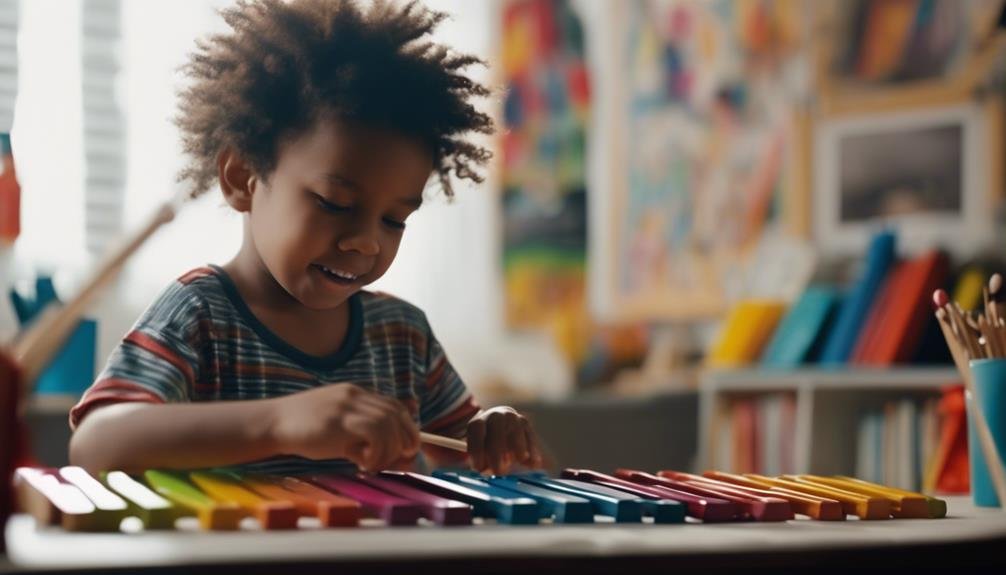"Cherishing Little Steps - A Haven for Baby and Family Journeys"
The Benefits of Learning a Musical Instrument in Early Childhood
Have you ever wondered how learning a musical instrument in early childhood could shape a child's future? The advantages go beyond just musical skills. From enhancing cognitive abilities to nurturing emotional well-being, the impact is profound.
But there's one aspect that often gets overlooked, a benefit that extends far beyond the music room and into various aspects of life. Stay tuned to discover this key advantage that makes learning a musical instrument in early childhood truly invaluable.
Key Takeaways
- Enhances problem-solving skills and memory retention, benefiting cognitive development.
- Reduces stress levels and boosts self-confidence, promoting emotional well-being.
- Builds self-assurance and coordination skills, enhancing confidence and physical abilities.
- Cultivates creativity and critical thinking, fostering innovation and artistic expression.
Cognitive Development

Reveal your child's full cognitive potential by introducing them to the world of music early on. Learning a musical instrument at a young age can greatly enhance problem-solving skills and memory retention. The intricate process of reading music, coordinating hand movements, and understanding rhythm stimulates various regions of the brain, fostering cognitive development in a holistic manner.
As your child engages with music, they're continually challenged to solve problems, whether it be deciphering a complex musical piece or coordinating different notes to create a harmonious tune. These challenges not only enhance their problem-solving skills but also encourage creativity and critical thinking.
The act of learning and practicing music requires a great deal of memory retention. From memorizing musical notes to recalling complex melodies, your child's memory capacity is constantly being exercised and improved through regular musical practice.
Emotional Well-being
Nurturing your child's emotional well-being through early exposure to learning a musical instrument is a powerful way to instill lifelong resilience and self-expression. Learning to play an instrument can have a profound impact on your little one's emotional development, providing them with a creative outlet to express themselves and cope with the ups and downs of life.
Here are four ways in which learning a musical instrument can benefit your child's emotional well-being:
- Stress Relief: Playing music has been shown to reduce stress levels and promote relaxation, helping your child unwind after a long day.
- Emotional Expression: Music allows children to convey their emotions in a safe and constructive manner, fostering a deeper understanding of their feelings.
- Self-Confidence: Mastering a musical piece can boost your child's self-esteem and belief in their abilities, translating to a more positive self-image.
- Connection: Sharing music with others can create bonds and foster a sense of belonging, nurturing your child's social and emotional connections.
Confidence Boost

Mastering a musical instrument early can greatly enhance your child's self-assurance and belief in their capabilities, fostering a strong sense of confidence that extends beyond musical accomplishments. When your child learns to express themselves through music, they develop a powerful form of self-expression that builds their self-esteem. Playing in front of others may initially cause performance anxiety, but as they conquer their fears and showcase their talent, their confidence skyrockets. This newfound assurance doesn't just apply to musical performances; it permeates various aspects of their life, helping them tackle challenges with a positive mindset.
| Benefits of Learning a Musical Instrument for Confidence Boost |
|---|
| Self-Expression |
| Performance Anxiety |
| Enhanced Self-Esteem |
Encouraging your child to engage with music not only nurtures their creativity but also equips them with the tools to navigate social situations and build resilience. Embracing music as a means of self-expression empowers them to communicate effectively and assert themselves confidently in all areas of life.
Coordination Improvement
Improving coordination skills through early music education lays a strong foundation for overall physical and mental development in children. When children engage with musical instruments from a young age, they enhance their fine motor skills and rhythmic abilities, setting them up for success in various aspects of life.
Here are four ways in which learning a musical instrument can boost coordination in children:
- Enhanced Fine Motor Skills: Playing instruments like the piano or violin requires precise finger movements, improving dexterity and control.
- Improved Hand-Eye Coordination: Reading sheet music while simultaneously playing an instrument helps children coordinate their visual and motor skills effectively.
- Better Posture and Body Awareness: Instruments such as the cello or flute promote good posture and body alignment, enhancing overall physical coordination.
- Developed Rhythmic Abilities: Learning to keep time and follow a beat in music aids in developing a sense of rhythm and coordination in children, which can translate to improved coordination in other activities.
Creativity Enhancement

Revealing a child's creative potential is a key benefit of early exposure to learning a musical instrument. By engaging in music from a young age, children are provided with a unique outlet for innovation cultivation and problem-solving skills. Music encourages them to think outside the box, experiment with different sounds, and create new melodies, fostering a mindset of creativity that extends beyond the domains of music.
| Innovation Cultivation | Problem-Solving Skills |
|---|---|
| Encourages experimentation | Enhances critical thinking |
| Promotes thinking creatively | Improves analytical skills |
| Fosters a culture of innovation | Encourages perseverance |
Learning a musical instrument allows for artistic expression and stimulates the imagination. Through music, children can convey their emotions, thoughts, and experiences in a creative manner, honing their ability to express themselves effectively. This artistic outlet not only enhances their musical capabilities but also nurtures a sense of creativity that can be applied to various aspects of their lives, enriching their overall development.
Social Skills Development
How can learning a musical instrument early positively influence your social skills development?
Playing a musical instrument from a young age can have a profound impact on how you interact with others and navigate social situations. Here are four ways in which learning a musical instrument can enhance your social skills:
- Communication Skills:
Music is a universal language that transcends barriers. Through playing an instrument, you learn to express yourself without words, honing your ability to communicate nonverbally and interpret cues from others.
- Teamwork Building:
Whether you're part of a band, orchestra, or ensemble, playing a musical instrument teaches you the importance of working together towards a common goal. You learn to listen to others, compromise, and contribute your part to create harmonious music.
- Empathy Development:
Music evokes emotions, and as you learn to play an instrument, you become more attuned to the feelings and experiences of those around you.
- Confidence Boost:
Mastering a musical instrument boosts your self-esteem, helping you feel more comfortable in social settings and improving your overall social interactions.
Frequently Asked Questions
How Can Learning a Musical Instrument Impact a Child's Academic Performance?
Learning a musical instrument in early childhood can positively impact your academic performance. It boosts cognitive development, enhances memory retention, and sharpens problem-solving skills. Embrace the joy of music – watch your achievements soar!
Are There Any Long-Term Benefits of Learning a Musical Instrument in Early Childhood?
Learning a musical instrument in early childhood offers long-term benefits. It enhances cognitive development, boosts social skills, fosters emotional expression, and refines motor skills. The joy of music becomes a lifelong companion, enriching your journey.
Can Learning a Musical Instrument Help Children With Special Needs or Learning Disabilities?
Learning a musical instrument can indeed help children with special needs or learning disabilities. It has been shown to improve focus, boost confidence, and provide a creative outlet for self-expression, fostering overall growth and development.
How Can Parents Support Their Child's Musical Journey and Foster a Love for Music?
To support your child's musical journey, get involved! Encourage practice routines and provide a nurturing environment. Expose them to various musical styles and offer family support. Fostering a love for music starts with your active participation and enthusiasm.
Are There Any Potential Drawbacks or Challenges to Consider When Introducing a Child to Learning a Musical Instrument at a Young Age?
Worried about potential challenges when introducing a child to a musical instrument? Remember, parental involvement is key. Embrace the journey, tackle obstacles together. Music's gift is worth the effort – enjoy the process!
Conclusion
To sum up, learning a musical instrument in early childhood has a multitude of benefits. Not only does it improve cognitive development and coordination, but it also enhances emotional well-being, boosts confidence, and fosters creativity.
By developing these skills and abilities at a young age, children are better equipped to navigate the complexities of life and excel in various aspects of their personal and social development.
So, why wait? Start the musical journey today and watch the magic unfold!


